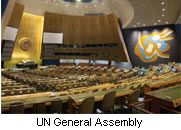 A senior United Nations official yesterday called on nations to double their efforts in the implementation of all four pillars of the world body’s Global Counter-Terrorism Strategy, emphasizing the need to shore up ‘soft’ power measures to combat terrorism.
A senior United Nations official yesterday called on nations to double their efforts in the implementation of all four pillars of the world body’s Global Counter-Terrorism Strategy, emphasizing the need to shore up ‘soft’ power measures to combat terrorism.
The strategy, adopted unanimously by the General Assembly in 2006, focuses on four key areas of action: tackling the conditions conducive to the spread of terrorism; preventing and combating terrorism; building State capacity and bolstering the role of the UN; and ensuring respect for human rights and the rule of law against the backdrop of the fight against terrorism.
Jean-Paul Laborde, who chairs the UN Counter-Terrorism Implementation Task Force (CTITF), made his appeal as the General Assembly is set today begin its biennial review of the strategy tomorrow.
Although progress in putting the strategy into practice has been made, the “pace has not moved as fast as many had hoped for,” he noted.
“We all know that hard power measures alone have failed to stop terrorist attacks or at least have not succeeded,” Mr. Laborde told reporters in New York this afternoon.
If just 10 per cent of the investment in hard power was put towards soft power measures, such as fostering education and promoting respect for human rights, “we really can reduce these terrorist threats,” he stressed.
Mr. Laborde, who also serves as Director of the Counter-Terrorism Implementation Task Force Office, underlined that it is “imperative” that using force to fight terrorism is combined with preventive measures to curb the potential recruitment and training of terrorists, as well as terrorist attacks before they happen.
A three-day CTITF-backed event along the sidelines of the Global Counter-Terrorism Strategy review also kicked off yesterday, with some 150 participants taking part in discussions on global efforts to fight terrorism.






